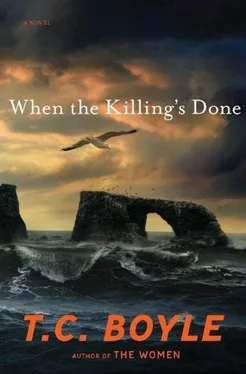“Yeah, well, thanks for coming,” Dave says, dropping the man’s hand.
An awkward pause follows, Stiles just staring at him as if awaiting a speech of praise and deliverance. After a moment he says, “This your place?”
“Yes.”
“Pretty pricey, I’d guess.”
Dave shrugs. “It’s California.”
“Tell me about it.” Another pause, longer this time. “But I’m a man of my word, no matter, and the price we agreed on if I’m not mistaking, is thirty apiece. That right?”
“That’s right. How many did you wind up—?”
“Ten. Each one in their own separate burlap bag,” he says, moving to the back of the SUV now and pulling open the rear hatch.
Dave peers in. There’s the same interior light he’s got on his car, the same gray carpet and hard vinyl storage compartments. Atop the carpet, a sheet of plastic, and atop the plastic, distributed like sacks of onions or potatoes, are the burlap sacks. Look closely and you can see movement there, a flex and release of muscle like a wave rippling and breaking across the dull tan surface of the material.
“You put ’em separate so you don’t get ’em biting each other. They’re not immune to their own poison, you got to know that. I seen it where they get so mad they bite their own self, like suicide. You don’t want that. Not at thirty per.”
Until this moment he hasn’t really considered the lethality of the things — they’re snakes, that’s all, rattlesnakes, and if Santa Catalina has them, why shouldn’t Santa Cruz, and so what if Dr. Alma happens to step on one some blissful sunny morning? That’s nature, isn’t it? But now, looking at the mute brown sacks and the living presence lurking inside them, he can feel a thrill run through him, no different from the thrill of fear and excitement he felt the first time he ever saw a gun, a pistol, an inert black metal object lying casually on a kitchen counter in a neighborhood kid’s house. It was just there, dully gleaming beside the sugar bowl and the cookie jar, but it had the potential to come fatally to life. “How do I handle them? I mean, will they bite through the bag or what?”
Stiles reaches in and slides one of the bags out, hefting it by the knot on top. His arm strains. The shape shifts inside the bag, going heavy at the bottom. “Might. But they like the bag, like the dark. They don’t want to bite what they can’t see — or fix on with their radar.”
“Radar?”
“That’s what I call it. Heat sensors. For detecting warm-blooded prey when they come out slinkin’ at night. Mice and such. Rabbits.” He holds out the bag. “Here, you want to hold it? No?” A smile now, ungenerous, pinched down at the corners. “You want a look at least, see you’re gettin’ your money’s worth?”
“No,” he hears himself say, waving the flat of one hand. “That’s okay.”
A silence. Stiles is watching him, that uncharitable look on his face still. “All right then, have it your way. That’ll be three hundred. Cash. And forget the gas money. You want me to put ’em in the back of your vehicle for you?”
“Yeah, sure,” Dave says, trying to extract his wallet from his pocket and flip open the rear hatch of the Yukon at the same time. “Am I going to need plastic like you have?”
A shrug. “They might shit, I guess. It’s a wicked smell once it’s in the carpet. But you can have this sheet here if you want. I got no use for it.”
And that’s it. Stiles flips back the plastic sheet like a waiter changing tablecloths and spreads it across the floor of Dave’s car, smoothing out the wrinkles with a brusque stroke of one hand. Then he hoists the burlap sacks, two at a time, laying them in gently on top. When he’s done, Dave hands him the money, three hundred-dollar bills. Stiles takes a moment, fanning them out in his hand before folding them once and stuffing them in his right front pocket. Then he tips an imaginary hat and climbs into the cab of his truck. The door slams. The engine turns over, smooth as a vacuum cleaner. One final thing, his head craning out the window, his smile so tight it’s almost a grimace: “Nice vehicle you got there.” There’s a soft mechanical thump as he eases the transmission into drive. “I do like your style.”
Dave is aboard the boat nearly an hour before he told the others to show up, stowing things (the snakes he intends as a surprise, sort of like the capper to the day, and he lays them gingerly below, one at a time, careful to keep the sacks away from contact with his body) and generally making ready to go to sea. There’s a stop at the fueling dock, then back to his berth to prepare the sandwiches and marinate the tofu and veggies for kebabs. The wine is in the cooler, beer too — Wilson’s a real beer hound — and the rabbits are in their cage under the table, with plenty of newspaper spread underneath to catch their droppings. To this point he never realized just how much food rabbits process, as if they evolved on the earth for the sole purpose of producing little balls of crap, infinite crap, and having them in the garage for the past two weeks was a real trial. It was Guadalupe’s husband who got them for him — cottontails, not the big lean jackrabbits he’d been hoping for — but it was the only avenue open to him. Salvador had trapped a pair of wild rabbits that had been raiding his garden three years back and he’d kept them in a pen and bred them for food, quite a thriving business, according to Guadalupe. Well, these five would be spared anyway, and cheap at five dollars apiece. The girls — both Anise and Alicia — cooed over them and fed them slivers of carrot, lettuce and whatnot for the first week, till they lost interest and left the custodial duties to him. But they’re hot to release them, that’s for sure. “We’ll have a little ceremony on the beach,” Anise said, squeezing his biceps. “A coming out party, Rabbits in Bunnyland . Won’t that be cool?”
As for raccoons, he struck out there. The traps yielded nothing but the same cat three nights in a row and then nothing at all. Ditto opossums, though he spotted two of them on the street out front of the house late one night a couple weeks back and he’s keeping the traps set and baited just in case. Gophers he’s given up on. They moved in within weeks of the raccoons’ departure, fanning up great conical mounds of dirt like miniature calderas all over the new lawn, and he consulted with his gardener over the problem. “Can you catch them — alive, I mean? Unhurt.” The gardener looked at him for a long while. Then, very slowly, measuring out his words, he said, “Poison or Macabee trap. Either way, they’re dead. You want pets, go to PETCO.”
Anise is the first to show. She’s wearing clogs and a crotch-high jumper kind of thing, in yellow, like the playsuits little girls used to wear when he was a kid, with the exception that she’s no little girl and her playsuit is cut deeply in front to show off what she has. Her bag is slung over one shoulder and she’s got a bottle of wine in each hand, one red, one white. “Cambria, honey. Martha’s Vineyard. My favorite.” She tips back her straw hat to peck him a kiss and then wrinkles up her nose. “What’s that smell?”
“The rabbits. Don’t you remember? This is their big day.”
Then she’s down on hands and knees, making kissing noises at the cage under the table and talking baby talk to the brainless nose-twitching things backed up against the wire mesh as if wire was all there was in the world. “Oh, the poor little bunnies, all stuck in that awful cage. Little bunnies, look at you. Nobody’s going to eat you now, don’t you worry. Uh-uh, not with Mommy here.”
He watches with real interest, the fringe of her skirt thrust up in back and her breasts gone heavy with gravity— Doggie-style , that’s the term that comes into his head — and how long has it been since they’ve had sex? Was it last weekend? Seven whole days? Three steps and he’s hovering over her, bending from the waist to peer into the cage, one hand seeking out the heat of her, right there where the flap of skirt rucks up and the tight silken material of the crotch takes over. “Mmm,” she murmurs, pushing back against his hand with a revolution of her hips, “that feels nice.”
Читать дальше












